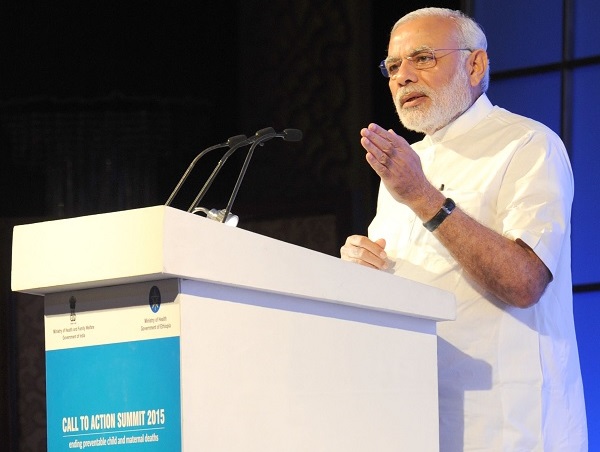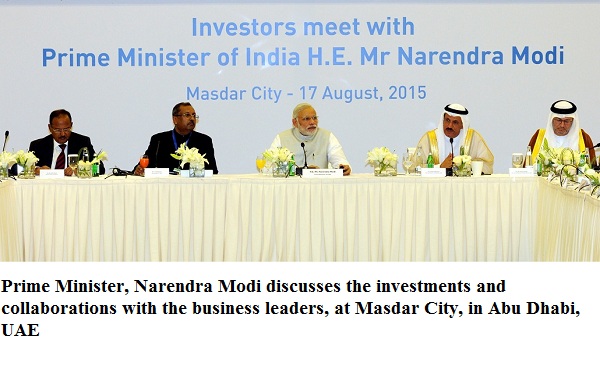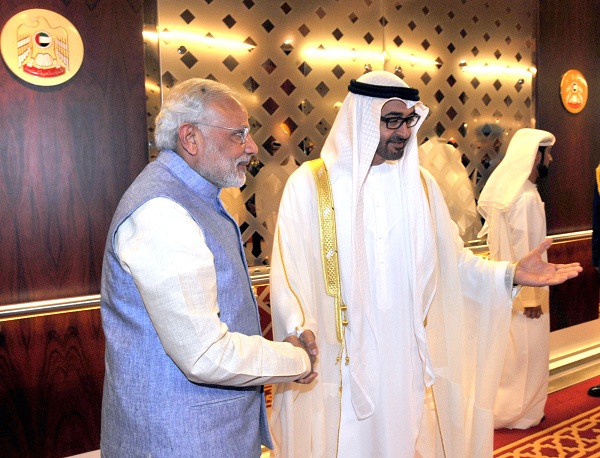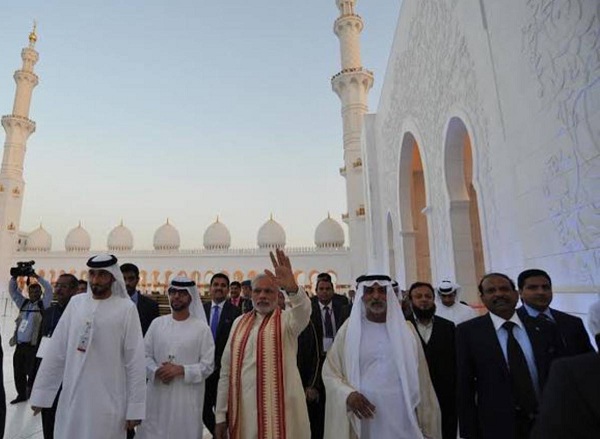
by Editor | May 25, 2021 | Business

Prime Minister, Narendra Modi delivering the keynote address at the Global “Call to Action” Summit 2015, in New Delhi
New Delhi:(IANS) Prime Minister Narendra Modi on Sunday said his government will not renew the land acquisition ordinance that lapses on Monday.
“We had issued an ordinance which lapses tomorrow (August 31). I have decided, let it lapse. We will not renew it,” Modi said during his radio address ‘Mann Ki Baat’ on Sunday.
“It will mean the situation will be once again as it was before my government came,” he said.
The prime minister said there were 13 points, referring to already existing Acts for acquiring land.
He said the rules would be changed to give farmers higher benefit under these laws.
Modi said a statutory order was being brought to include 13 central Acts to extend benefits to those farmers whose land is acquired. “The government’s heart is clear on the land Act. We are ready to accept any recommendation that favours the farmers.”
“The ordinance will lapse, but those 13 points (Acts) will be brought under the rules so that the farmers do not suffer economic loss,” he said.
According to official sources, a statutory order issued by the government will ensure that farmers whose land are acquired under the 13 acts like the Land Acquisition (Mines) Act, 1885, the Metro Railways (Construction of Works) Act, 1978, and the National Highways Act, 1956, get higher compensation.
The executive order issued under section 113 of the land acquisition law, enacted by the erstwhile Congress-led United Progressive Alliance (UPA) government, extends compensation and resettlement benefits under the law to the land acquired under 13 central Acts so far not covered.
This would mean the land acquired for any purpose would now be eligible for the high compensation and resettlement under the Right to Fair Compensation and Transparency in Land Acquisition, Rehabilitation and Resettlement Act, 2013 — the UPA version of the Act.
The ordinance was brought after the Bharatiya Janata Party-led government failed to get its amended land acquisition bill passed in parliament. The ordinance has so far been re-promulgated thrice.
Modi said rumours were being spread over the Act.
“The proposal for amendment in the Land Acquisition Act came from the states. Every one felt if the farmer has to be benefited, if we have to make canals to take water to farms, erect poles to take electricity to villages, make roads, or houses for rural poor, we will have to get the law out of the bureaucratic tangles and so the proposal of changing the law came,” Modi said.
“But so many rumours have been spread. Farmers have been scared. My farmer brothers and sisters, don’t be scared. For me, every voice in the nation is important and the voice of farmers has a special place,” he said.
“There is no reason for doubt, do not be scared,” Modi added.
The BJP-led National Democratic Alliance’s land bill is presently with a joint committee of parliament.

by Editor | May 25, 2021 | Corporate, Corporate Governance

Prime Minister Narendra Modi at the inauguration of the birth centenary of Rani Gaidinliu, in New Delhi
New Delhi:(IANS) Prime Minister Narendra Modi on Monday said that developing infrastructure in the north-eastern region is being given top priority by the government.
“India will develop only if the northeast develops,” Modi said, while speaking at function at Vigyan Bhavan here to celebrate the birth centenary of Rani Gaidinliu, the legendary freedom fighter from Nagaland.
“We are putting in maximum efforts to build infrastructure in the north-east,” he said.
The prime minister also said that following the resolution of the border dispute with Bangladesh, connectivity with the northeast was set to become easier.
“The northeast has now become closer to the rest of India,” he said.
Stating that the north-east was blessed with abundant natural bounty, he said that the region has the potential to become the organic capital of the country.
Recalling Rani Gaidinliu’s contribution in India’s fight for freedom, he said that it was unfortunate that countless heroes of the freedom struggle all over the country were forgotten.
“It is unfortunate that… several people who fought for freedom are not so well known,” Modi said.
Extolling the role of Rani Gaidinliu in the freedom struggle, Modi said: “Can you imagine that she joined the freedom struggle at the age of 12-13? And soon after she was jailed for life.”
Born on January 26, 1915, Rani Gaidinliu joined her cousin Haipou Jadonang’s movement at the age of 13 to drive out the British from Manipur.
In 1932, she was arrested at the age of 16 and sentenced to life in prison.
She was released from Tura jail (now in Maghalaya) after having spent 14 years in various prisons.
She died on February 17, 1993, at Longkao in Manipur.

by Editor | May 25, 2021 | Business Summit, Economy, Events, News

Prime Minister, Narendra Modi discusses the investments and collaborations with the business leaders, at Masdar City, in Abu Dhabi, UAE
Abu Dhabi:(IANS) Prime Minister Narendra Modi on Monday wooed top UAE business honchos, saying India has the potential of $1 trillion investments and also promised to address the concerns of business persons.
Addressing an investors roundtable in Masdar City, a zero carbon city, Modi also promised to erase the deficit of prime ministerial interactions of the past 34 years. Former prime minister Indira Gandhi was the last Indian prime minister to visit in 1981.
He said that though there are 700 flights between India and the UAE but it took 34 years for an Indian prime minister to visit. “I promise this will not happen again,” he said.
Taking pot shots at the previous UPA regime, Modi said he has “some problems in legacy” and that some measures were stalled due to the “indecisiveness and lethargy” of past governments.
“It is my priority to kickstart those things,” Modi said.
Modi said he had been informed about some problems being faced by UAE business persons and added, “I want to assure we are solving these problems.”
He said he will send Commerce Minister Nirmala Sitharaman to try and find solutions to the problems being faced by some UAE investors.
He said that “UAE’s power and India’s potential can make the dream of an Asian Century a reality”.
“It is now commonly believed that India is one of the fastest growing economies. There are several opportunities of development in India. I feel India is a land of many opportunities. The 125 crore people of India are not a market but they are a source of great strength,” he said.
Top corporate honchos attended the meet. “A Who’s Who of UAE Business. UAE and Indian industrialists come together to meet PM @narendramodi,” said ministry of external affairs spokesperson Vikas Swarup.
Those who attended the meet included Etisalat CEO Ahmed Abdulkarim Julfar and Emaar Properties chairperson Mohammed Ali Al Abbar.
Modi said that India now had a decisive government with full majority, and several sectors including insurance, railways, defence manufacturing have been opened up for foreign investment. He touched upon renewable energy, port-led development and low-cost housing as sectors with huge investment potential, said an official statement.
He said that if India and UAE work together, they can make the vision of an Asian century a reality. He said UAE would be the economic focus of the Asian century.
Earlier, he took a tour of Masdar City, a hub of clean technology.
He was accompanied on an hour-long visit of Masdar City by senior officials, who briefed him on various aspects of the project.
He travelled briefly on the PRT (Personnel Rapid Transit) car – a driver-less vehicle which runs from point to point on magnetic strips.
Modi also visited the Micro-Nano Fabrication Facility and the Microscopy Lab. He went on a brief walking tour of the city’s public spaces and was informed about the sustainable building methodology and key architectural elements.

by Editor | May 25, 2021 | Muslim World

Prime Minister Narendra Modi with Crown Prince of Abu Dhabi, His Highness Sheikh Mohammed bin Zayed Al Nahyan
ABU DHABI:(IANS) Prime Minister Narendra Modi on Sunday arrived in the United Arab Emirates in the first prime ministerial visit in over three decades, with boosting trade and investment on top of his agenda.

Prime Minister Modi at the Grand Shaikh Zayed Mosque Abu Dhabi
Modi, who is here on a two-day official visit, was received by Abu Dhabi Crown Prince Sheikh Mohamed bin Zayed Al Nahyan at the airport and accorded a ceremonial welcome.
In a significant gesture, five brothers of the crown prince were also present at the Abu Dhabi Presidential Airport to receive Modi, according to tweets by external affairs ministry spokesperson Vikas Swarup.
Modi, the first Indian prime minister to visit the UAE after the 1981 visit of Indira Gandhi, went straight to the Sheikh Zayed Grand Mosque, the biggest mosque in Abu Dhabi. He spent some time there and also took a selfie with Sheikh Nahyan bin Mubarak Al Nahyan and Anwar Gargash at the mosque.

Prime Minister Modi at the Grand Shaikh Zayed Mosque Abu Dhabi
He wrote in the visitor’s book, saying: “I am confident that it will be a symbol of peace, piety, harmony and inclusiveness that are inherent to the faith of Islam.”
In a significant development, the UAE decided to allot land for building a temple in Abu Dhabi for the Indian community.
“A long wait for the Indian community ends. On the occasion of PM’s visit, UAE Govt decides to allot land for building a temple in Abu Dhabi,” tweeted Swarup.
“PM @narendramodi thanks UAE leadership for this landmark decision,” he said.
Modi held talks with the UAE leadership “on ways to enhance bilateral ties of friendship and cooperation and exchanged views on a variety of regional and international issues of mutual interest”, said WAM, the UAE’s national news agency.
The crown prince expressed his delight at Modi’s visit, which, he said, “comes within the context of the distinguished historic, friendly bilateral ties whose foundation was laid down by the late founding father, Sheikh Zayed bin Sultan Al Nahyan based on culminated into a strong partnership”, said WAM.
He emphasised the UAE’s “keenness to further broaden its scope of joint cooperation with India”.
Later, Modi also visited the ICAD Residential City here, a labour camp housing about one lakh migrant workers from India and other countries of the subcontinent.
Modi interacted with a select group of Indian migrant workers at the ICAD city.
The ICAD camp, spanning about 14 sq km, is also known as the ICAD Workers’ Village, and was built three years ago for workers.
The PMO tweeted: “Team India in UAE, interacting with PM @narendramodi.”
In the evening, he discussed investment opportunities during a dinner hosted by the Abu Dhabi Investment Authority (ADIA), that controls the $800 billion sovereign wealth fund of the oil-rich Gulf country.
Star chef Sanjeev Kapoor was flown to Abu Dhabi to dish up a special vegetarian fare for Modi, a strict vegetarian, by the Abu Dhabi Investment Authority.
“Discussing invest opprts over high level dinner. HH Hamed bin Zayed Al Nahyan, MD of Abu Dhabi Inv. Authority hosts PM,” tweeted Swarup.
The ADIA sovereign wealth fund is said to be the world`s second largest sovereign wealth fund.
Modi will be seeking to tap the sovereign wealth fund for infrastructure projects in India.
Excitement is high among the Indian expatriates in the UAE, who number 2.6 million, regarding Modi’s visit.
Around 20 percent of the Indian workers are white-collar professionals. Indian expatriates comprise 30 percent of the UAE’s population and are the largest nationality group.
Indians in the UAE are the largest remitters globally, and sent $12.64 billion to their country in 2014. India is also the third largest source of tourists travelling to the UAE.
Earlier, ahead of his visit, Modi in an interview to the Khaleej Times said: “”I want to see the UAE as our foremost trade and investment partner. We would build regular and effective cooperation in a full range of security challenges. Our armed forces would engage with each other more. We will work together more closely in international forums and in addressing regional challenges. There are no limits to our relationship.”
The India-UAE trade crossed $59 billion in 2014-15, making the country India`s third largest trading partner after China and the US.
On Monday, Modi is to visit the sustainable Masdar City, where he will address the UAE business community.
Modi will attend a special lunch reception hosted by the Indian Embassy at the Oberoi Hotel in Business Bay, where 25 top business community members will be in attendance.
His last engagement on Monday is a public engagement with the Indian diaspora at the Dubai Cricket Stadium where around 50,000 Indian expatriates have registered to attend.
Modi returns later at night.

by Editor | May 25, 2021 | Economy, News, Politics

Prime Minister, Narendra Modi meeting the Crown Prince of Abu Dhabi, His Highness Sheikh Mohammed bin Zayed Al Nahyan, at Abu Dhabi on August 16, 2015.
New Delhi:(IANS) The importance of Prime Minister Narendra Modi’s visit to the UAE, the first after Indira Gandhi’s in 1981, can be gauged from the Gulf nation’s place in India’s energy security as the sixth largest import-source of crude oil in 2014-15.
“The Gulf region is vital for India’s economic, energy and security interests,” Modi told the Khaleej Times in an interview.
Bilateral trade has grown significantly from a level of $180 million in the 1970s to around $60 billion per annum now, making the UAE India’s third-largest trading partner for 2014-15 after China and the US.
Modi’s visit, external affairs ministry sources said, will focus on attracting investment by the United Arab Emirates'(UAE) massive oil-financed sovereign wealth fund that for Abu Dhabi is reported to be worth over $800 billion.
Meanwhile, plunging global crude oil prices that have again dropped below the psychological $50-a-barrel mark this year have forced the UAE government to cut down on subsidies and deregulate petrol and diesel prices last month, resulting in an increase by 24 percent in the price of petrol to $0.58 per litre.
The troubles from falling oil prices indicate that the six-member oil rich Gulf Cooperation Council (GCC), of which the UAE is a member, is starting to feel the pinch, according to Amit Bhandari, a fellow at the Mumbai-based foreign policy think-tank Gateway House.
“The GCC accounts for just over 16 percent of India’s exports, including discretionary items such as gems and jewellery. Weak GCC economies can hurt Indian exporters and spell trouble for Indian banks,” Bhandari said.
He pointed out that during the 2008 economic crisis, activities such as construction came to a halt in Dubai, rendering thousands of Indian workers jobless.









